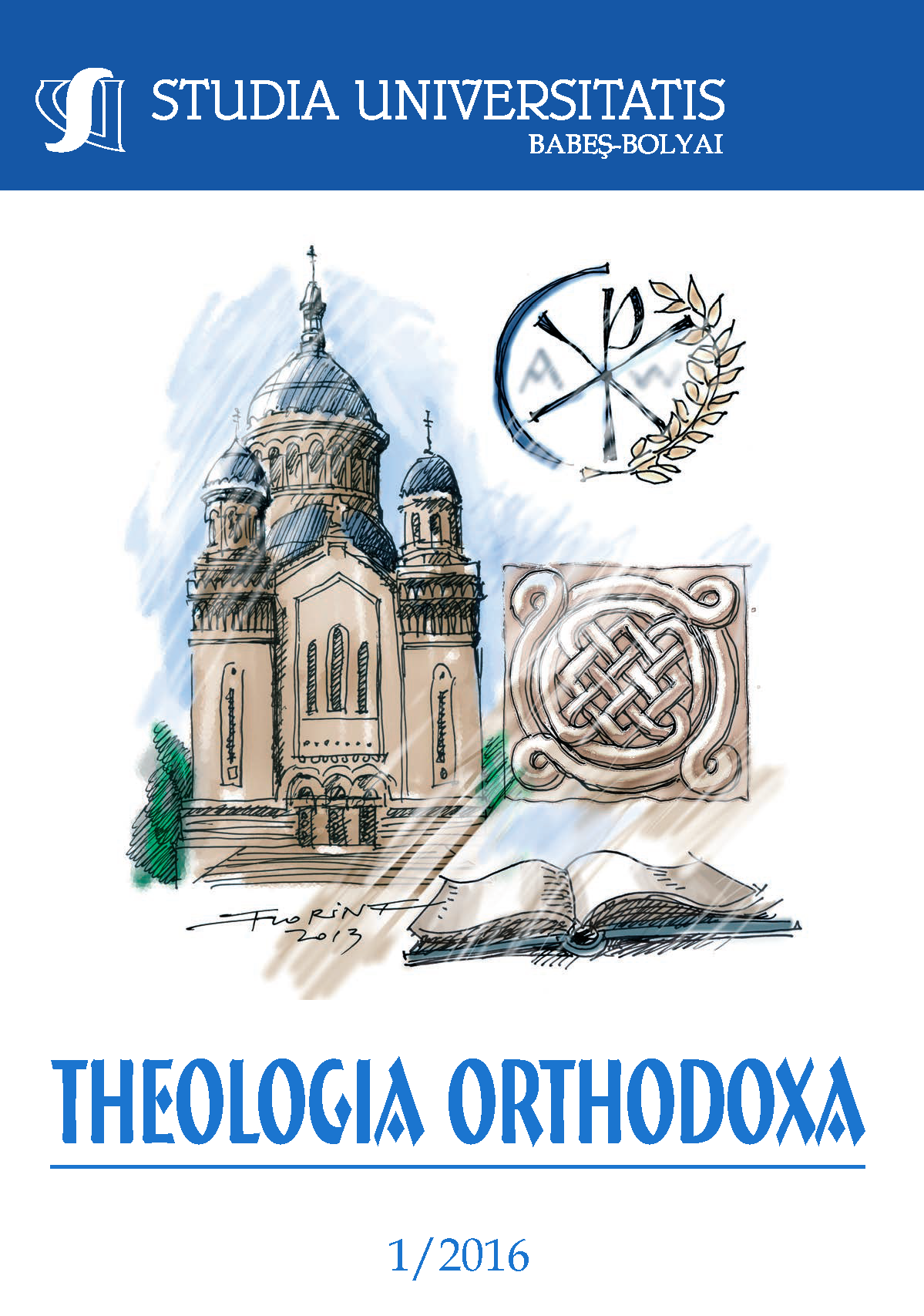PIETISTIC WAY OF LIFE AND SOPHIOLOGY: SPINOZA’S RECEPTION BY THE RADICAL PIETIST GOTTFRIED ARNOLD (1666-1714)
Keywords:
Spinoza, Pietism, Sophiology, acosmism, Pantheism, fatalism, philosophy as way of lifeAbstract
After the fierce polemic (1720-1740) between Joachim Lange and his Pietist companions from Halle, on one hand, and Christian Wolff as representative of the Enlightenment, on the other hand, the two sides have reached a common denominator: the refutation of the philosophy of Benedict Spinoza as acosmism/Pantheism with fatalist consequences. Spinoza and the Spinozism became the common enemy of both, Pietism and Enlightenment. Against such an interpretation, the German radical Pietist Gottfried Arnold proposes in the second volume of his work Unpartheyische Kirchen- und Ketzer-historie (1700/1741) another, very original Spinoza’s reading. The Dutch philosopher thinks and actually lives as an authentic Pietist. He affirms and practices the unity between thinking and life and proposes a kind of metaphysics of the unity between God and nature, which should not be understood as pantheism, but as sophiology: all the things are included in God because their concepts are thought by the Eternal Wisdom of God.
References
Arnold, Gottfried. Unpartheyische Kirchen- und Ketzer-historie vom Anfang des Neuen Testaments biß auf das Jahr Christi 1688. [1699-1700], bey dieser neuen Auflage
an vielen Orten verbessert, und in bequemere Ordnung bgebracht, wie auch mit verschiedenen nützlichen Anmerckungen und einem weitläuffigem Anhang vermehert. Bd. II. Schaffhausen, 1741.
Arnold, Gottfried. Das Geheimniss de Göttlichen Sophia oder Weißheit/ Beschrieben und Besungen von Gottfried Arnold (Leipzig, 1700).
Böhme, Jacob. De triplici vita hominis, oder vom Dreyfachen leben des Menschen. Amsterdam, 1682.
Bollacher, Martin. Der junge Goethe und Spinoza. Studien zur geschichte des Spinozismus in der |Epoche des Sturms und Drangs, Studien zur deutschen Literatur, hg. Richard Brinkmann, Friedrich Sengle und Klaus Ziegler, Bd. 18. Tübingen: Max Niemeyer Verlag, 1969.
Clark, William. “The Death of Metaphysics in Enlightened Prussia.” In The Sciences in Enlightened Europe, by William Clark, Jan Golinski, and Simon Schaffer, 423-426. Chicago and London: The University of Chicago Press, 1999.
Cook, J. Thomas. Spinoza’s Ethics. A Reader’s Guide. London and New York: Continuum, 2007.
Czelinski-Uesbeck, Michael. Der Tugendhafte Atheist. Studien zur Vorgeschichte der Spinoza-Renaissance in Deutschland. Würzburg: Königshausen & Neumann, 2007.
Dibelius, Franz. Gottfried Arnold. Sein Leben und seine Bedeutung für die Kirche und Theologie. Eine kirchenhistorische Monographie. Berlin: Verlag von Wilhelm Hertz, 1873.
Fix, Andrew Cooper. Prophecy and Reason: The Dutch Collegiants in the Early Enlightenment. Princeton: Princeton University Press 1990.
Gawlick, Günter. “Einige Bemerkungen über Christian Wolffs Verhältnis zu Spinoza.” In Spinoza im Deutschland des actzehnten Jahrhunderts. Zur Erinnerung an Hans-Christian Lucas, by Eva Schürmann, Norbert Waszek, and Frank Weinreich, 109-120. Stuttgart – Bad Cannstatt, 2002.
Jakuszko, Honorata. “The Spinoza Inspiration in the Late German Enlightenment (Spätaufklärung).” Studies in Logic, Grammar and Rhetoric 15 (28) (2009): 173-88.
Jelles, Jarrig. “Vorrede vor des Verfassers nachgelassenen Werken. Geneigter Leser.” In B. v. S. Sittenlehre widerlegt von dem berühmten Weltweisen unserer Zeit Herrn Christian Wolff. Aus dem Lateinischen übersetzt, 7-56. Frankfurt und Leipzig, 1744.
Jung, Martin H. Pietismus. Frankfurt am Main: Fischer Taschenbuch Verlag, 2005.
Marschke, Benjamin. “From Heretics to Hypocrites. Anti-Pietist Rhetoric in the Eighteenth Century.” In Kinship, Community, and Self: Essays in Honor of David Warren Sabean, by Jason Coy, Benjamin Marschke, Jared Poley, and Claudia Verhoeven. Spektrum: Publications of German Studies Association, vol. 9, 122-131. Berghahn Books, 2015.
Morisson, J.C. “Christian Wolff’s Criticisms of Spinoza.” Journal of History of Philosophy 31 (1993): 405-420. Reprinted in Genevieve Lloyd (ed.). Spinoza. Critical Assessments, vol. IV: The Reception and Influence of Spinoza’s Philosophy, 122-137. London-New York: Routledge, 2001.
Ocoleanu, Picu. Sophia Parthenos. Etica sofianică a vieţii contemplative în pietismul german şi în sofiologia ortodoxă rusă. Craiova: Ed. Mitropolia Olteniei, 2014.
[Schmidt, Johann Lorenz]. “Vorrede zu dieser Übersetzung.” In Sittenlehre widerlegt von dem berühmten Weltweisen unserer Zeit Herrn Christian Wolff, 3-6. Frankfurt und Leipzig, 1744.
Seidel, Helmut. Spinoza zur Einführung. Hamburg: Junius Verlag, 1994.
Spinoza, Benedictus von [B. v. S.]: Sittenlehre widerlegt von dem berühmten Weltweisen unserer Zeit Herrn Christian Wolff. Aus dem Lateinischen übersetzt. Frankfurt und Leipzig, 1744.
Spinoza, Benedict de. “Correspondence.” In The Chief Works of Benedict de Spinoza, vol. II, translated from the Latin by R.H.M. Elwes, 275-420. London: G. Bell, 1884.
Spinoza, Benedict de. “On the Improvement of the Understanding [Tractatus de intellectus emendatione].” In On the Improvement of the Understanding, Ethics and Correspondence, by Benedict de Spinoza. Translator R.H.M. Elwes, 1-38. New York: Cosimo Classics, 2006.
Vaught, Ashley Underwood. “The Specter of Spinoza in Schelling’s ‘Freiheitsschrift’”. A Dissertation Presented to the Faculty of the department of Philosophy, Villanova University, UMI, 2008.
Wolff, Christian. Oratio de Sinarum philosophia practica [1721]: lat.-dt. Aufl.: Rede über die praktische Philosophie der Chinesen, übers., eingel. und hg. von M. Albrecht. Philosophische Bibliothek, Bd. 374. Hamburg: Meiner Verlag, 1985.
[Wolff, Christian]. Herrn Christian Wolfs Widerlegung der Sittenlehre B. v. S. aus dem andern Theile seiner natürlichen Gottesgelahrtheit genommen. Frankfurt und Leipzig, 1744.
Downloads
Published
How to Cite
Issue
Section
License
Copyright (c) 2016 Studia Universitatis Babeș-Bolyai Theologia Orthodoxa

This work is licensed under a Creative Commons Attribution-NonCommercial-NoDerivatives 4.0 International License.





 ISSN (print): 1224-0869, ISSN (online): 2065-9474, ISSN-L: 2065-9474
ISSN (print): 1224-0869, ISSN (online): 2065-9474, ISSN-L: 2065-9474